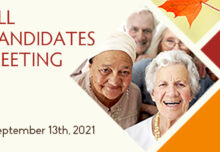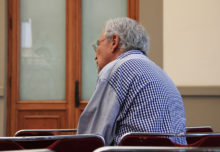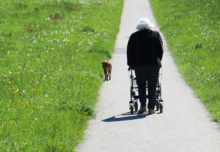Frailty In Seniors – How to minimize your risk for injuries
Written by Marisa Moody
I work with many seniors who see this risk and are taking action to turn their health around. Together, we work on strength and balance exercises with the goal of decreasing the likelihood of serious injury and fracture, should a fall occur.
Think it’s too late to start and see a difference? Think again.
“Research has proven that it’s never too late to start! Individuals in their 90’s (and older) can do resistance training with weights to improve physical function. If you are unable to do high-impact exercises, there are plenty of low-impact, weight-bearing exercises that you can do to improve your bone density and your general overall health”.[i]
One female client, age 78, who I train regularly, has body scans done every six months to chart her bone density. Through these scans, she was able to see the results of her efforts with strength training and cardiovascular exercise.
If you have fallen out of the regular habit of physical activity (or never developed the habit in the first place), you are not alone. However why sit on the end of the spectrum that puts you at higher risk for fractures? Why not put in a little effort now to ensure you age as well as possible, with fewer health concerns (and hopefully fewer medications, hospital visits and general aches and pains)?
Exercising is the simplest and easiest first step to prevent a wide range of health issues (physical & mental).
Don’t know where to start?
Here are some suggestions:
Something is Better than Nothing
Although numerous studies have proven the benefits of strength training in improving bone density, doing anything physical to start is better than nothing. Invite your friends to join you for a walk. Park further away at the grocery store. Go indoors and walk at the mall if the weather is poor. Practice getting up and down from your chair several times throughout the day. Work to improve your balance (while holding on to the back of a chair if necessary), lift one foot, than the other. Rock from your toes to your heels. Move your hips in circles clockwise and counter clockwise.
Find a Registered Personal Trainer
Find a personal trainer who specializes in working with Older Adults. This will ensure you receive one- on- one attention from someone who is educated in the concerns and issues that you may be facing. They will be kind, understanding and work with you at your level. You may not even have to go to a gym – many simple strength building exercises can be done in the comfort of your own home!
Join a Group Class
There are many group fitness classes specifically for older adults & seniors. The pace and exercises will be chosen with the group’s ability in mind and you may find good company and support from the other attendees.
Ask for Help
If your health is a concern to you and you would like to improve it ask those around you for some suggestions. Talk to staff at your local community centre, your friends, children or grandchildren. The people in your life want you to be as healthy as possible as you age, so they will likely be happy to help you set up the proper resources you need to improve your health.
Consult your Physician
Before starting any new exercise regime you should discuss it with your physician. Your Doctor will give you the go-ahead and possibly some guidelines to keep in mind. This information is important to pass on to a personal trainer if you are working with one or group fitness instructor if you are participating in a class.

Marisa is a BCRPA Personal Trainer with specialization in training Older Adults. If you have any questions or are interested in improving your health you can contact her at 604-376-0515 or info@motivatedmovementpt.com
References:
[i] http://www.bidmc.org/YourHealth/Health-Notes/Bones-and-Joints/Bones-As-You-Age/Seniors-Can-Prevent-Bone-Loss-Fractures.aspx





